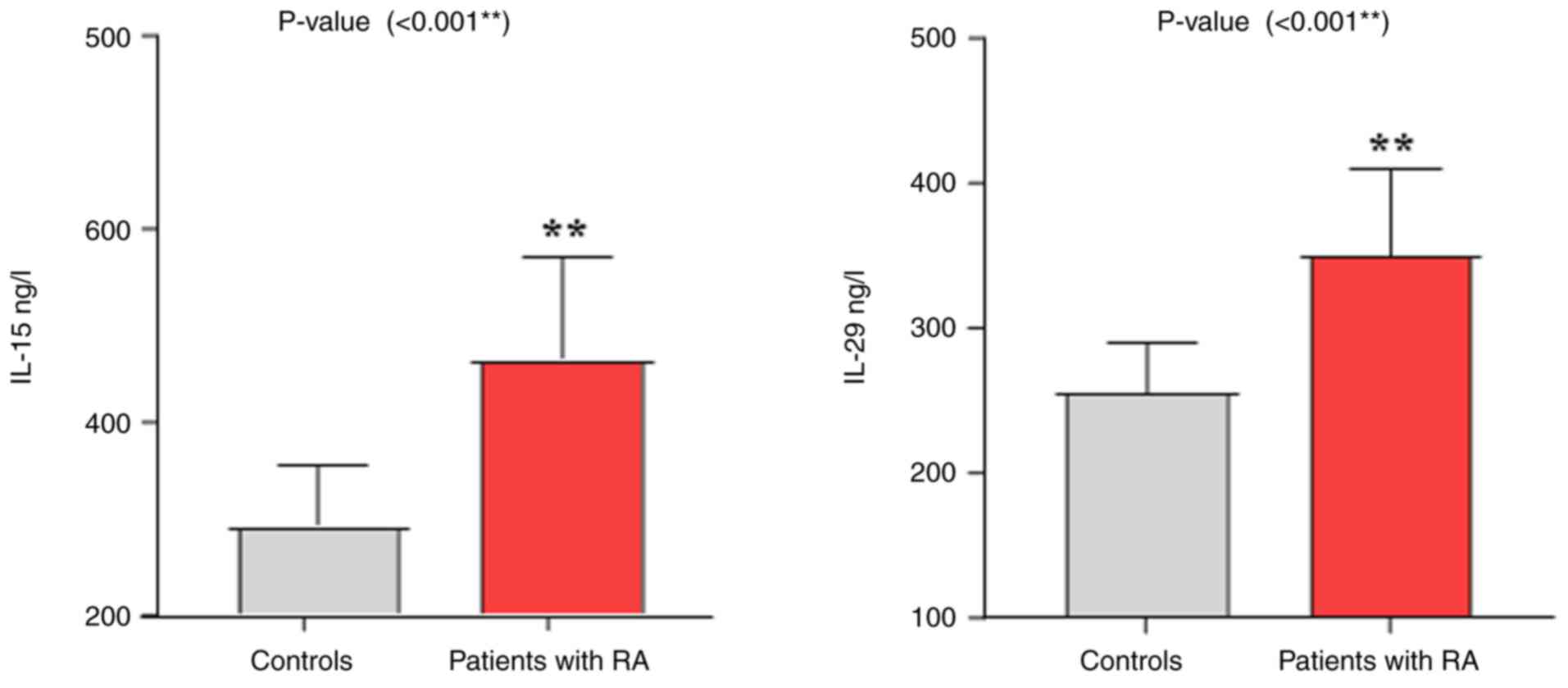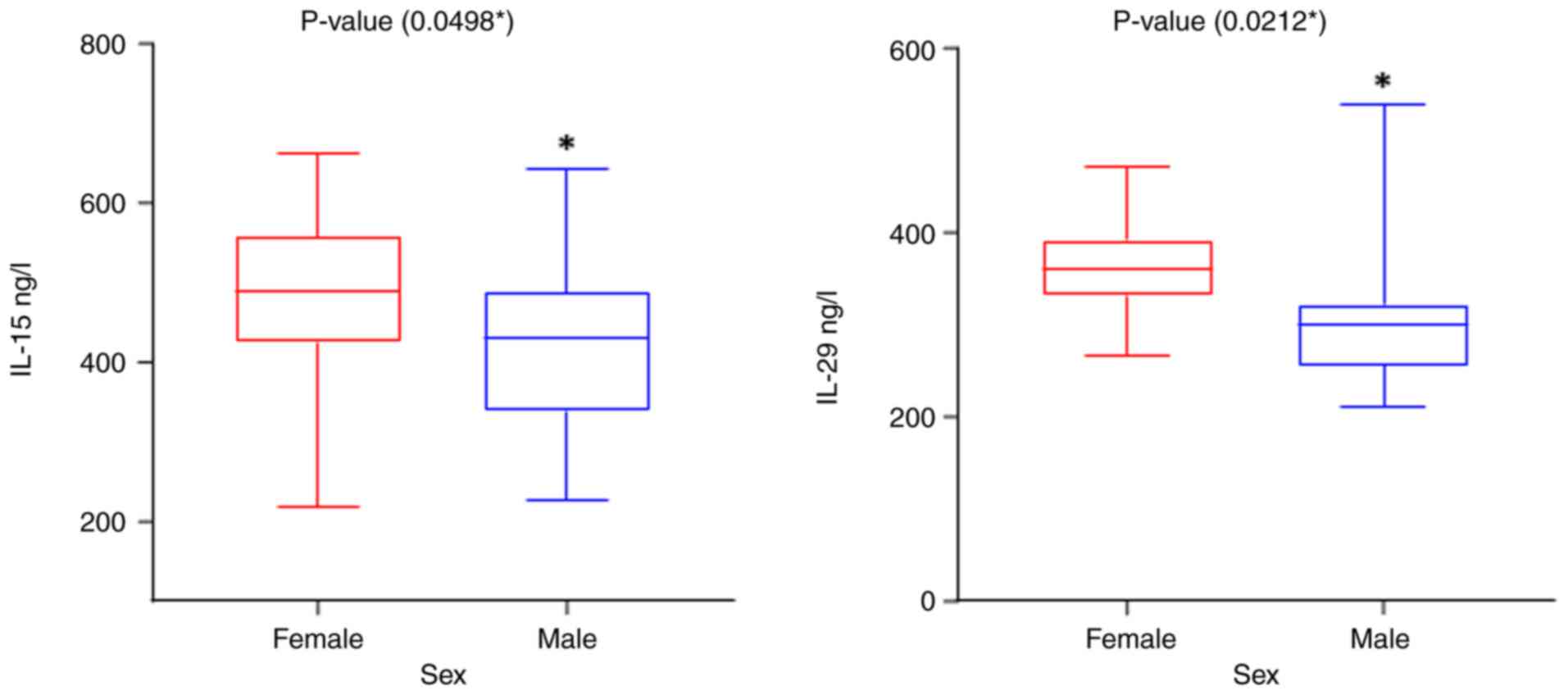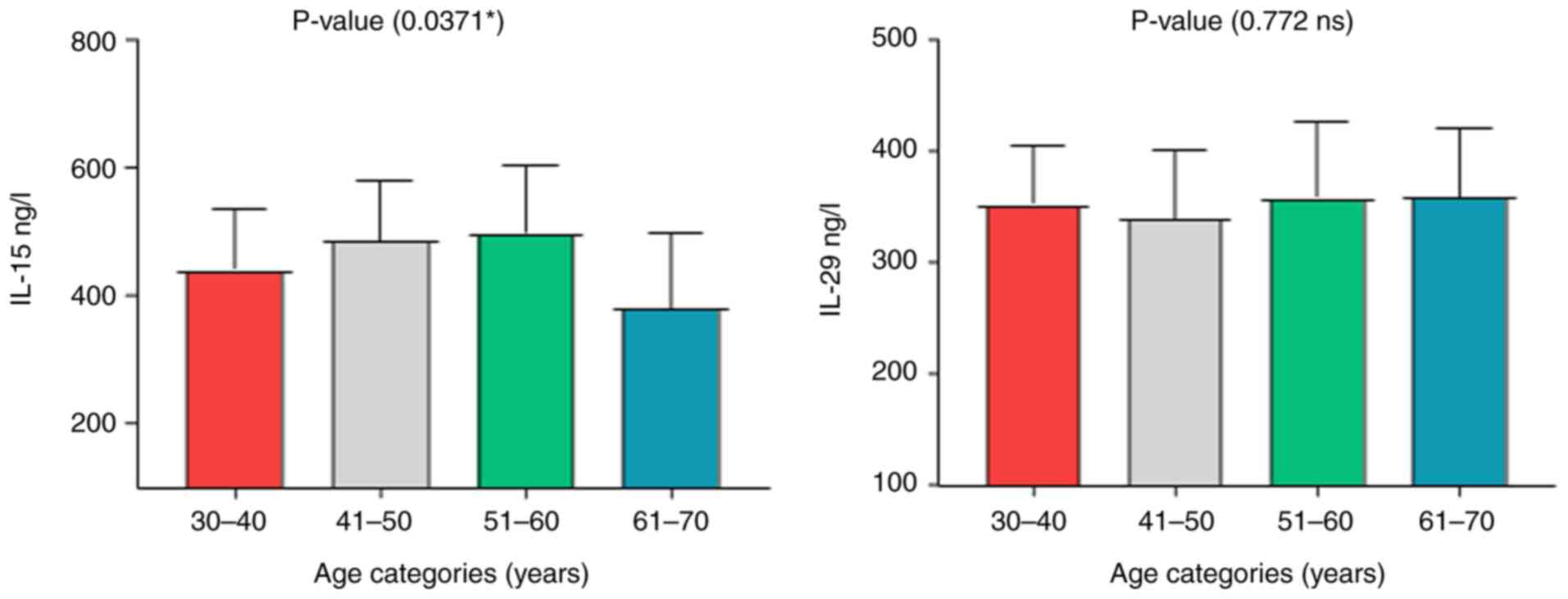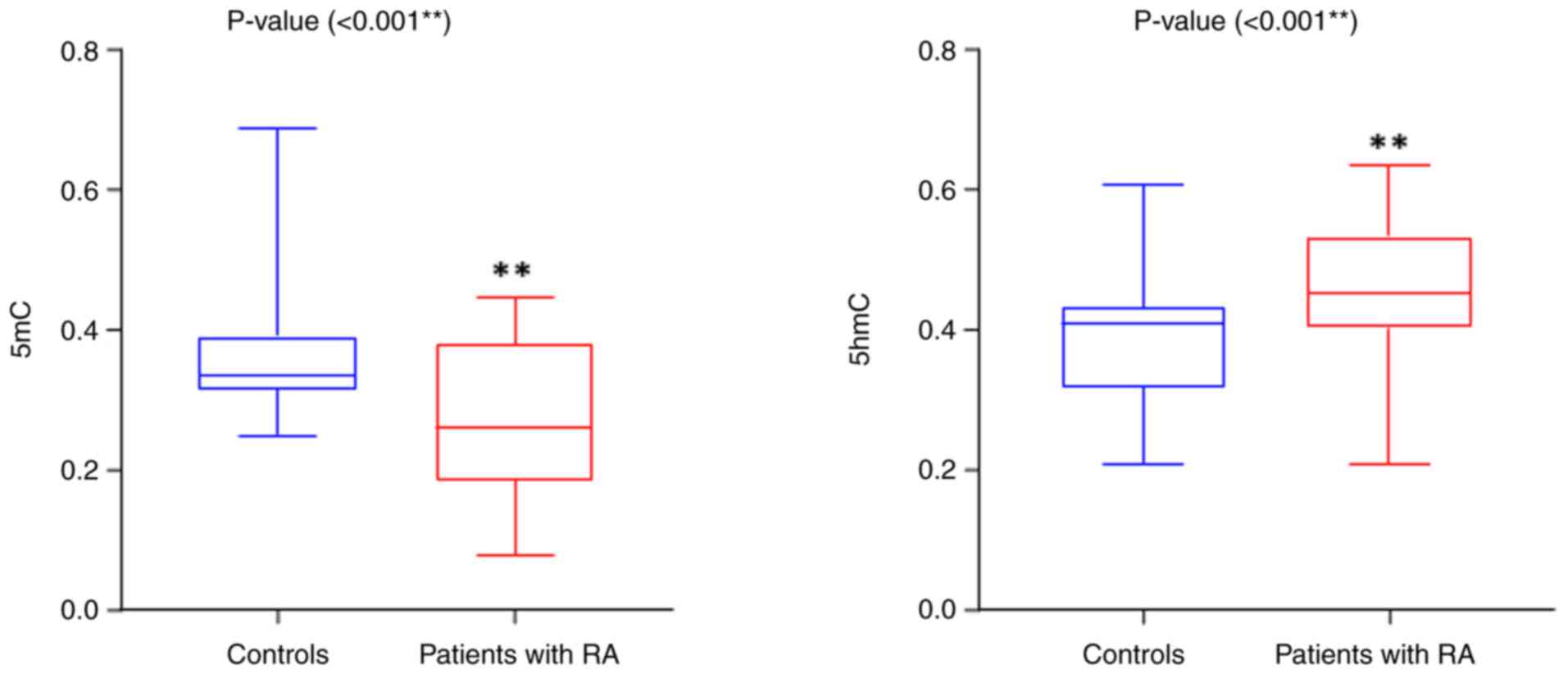|
1
|
Sokolova MV, Schett G and Steffen U:
Autoantibodies in rheumatoid arthritis: Historical background and
novel findings. Clin Rev Allergy Immunol. 63:138–151.
2021.PubMed/NCBI View Article : Google Scholar
|
|
2
|
Zhang HG, McDermott G, Seyok T, Huang S,
Dahal K, L'Yi S, Lea-Bonzel C, Stratton J, Weisenfeld D, Monach P,
et al: Identifying shared genetic architecture between rheumatoid
arthritis and other conditions: A phenome-wide association study
with genetic risk scores. eBioMedicine. 92(104581)2023.PubMed/NCBI View Article : Google Scholar
|
|
3
|
Rija FF, Hussein SZ and Abdalla MA:
Physiological and immunological disturbance in rheumatoid arthritis
patients. Baghdad Sci J. 18(0247)2021.
|
|
4
|
Li Z and Wang XQ: Clinical effect and
biological mechanism of exercise for rheumatoid arthritis: A mini
review. Front Immunol. 13(1089621)2023.PubMed/NCBI View Article : Google Scholar
|
|
5
|
Poniewierska-Baran A, Bochniak O, Warias P
and Pawlik A: Role of sirtuins in the pathogenesis of rheumatoid
arthritis. Int J Mol Sci. 24(1532)2023.PubMed/NCBI View Article : Google Scholar
|
|
6
|
Edilova MI, Akram A and Abdul-Sater AA:
Innate immunity drives pathogenesis of rheumatoid arthritis. Biomed
J. 44:172–182. 2021.PubMed/NCBI View Article : Google Scholar
|
|
7
|
Mutlak QM and Kasim AA: Impact of MTHFR
gene polymorphism on the outcome of methotrexate treatment in a
sample of Iraqi rheumatoid arthritis patients. Sci Rep.
14(15119)2024.PubMed/NCBI View Article : Google Scholar
|
|
8
|
Laragione T, Harris C, Azizgolshani N,
Beeton C, Bongers G and Gulko PS: Magnesium increases numbers of
Foxp3+ Treg cells and reduces arthritis severity and joint damage
in an IL-10-dependent manner mediated by the intestinal microbiome.
EBioMedicine. 92(104603)2023.PubMed/NCBI View Article : Google Scholar
|
|
9
|
Matsumoto H, Fujita Y, Asano T, Matsuoka
N, Temmoku J, Sato S, Yashiro-Furuya M, Yokose K, Yoshida S, Suzuki
E, et al: Association between inflammatory cytokines and
immune-checkpoint molecule in rheumatoid arthritis. PLoS One.
16(e0260254)2021.PubMed/NCBI View Article : Google Scholar
|
|
10
|
Reyes-Pérez IV, Sánchez-Hernández PE,
Muñoz-Valle JF, Martínez-Bonilla GE, García-Iglesias T,
González-Díaz V, García-Arellano S, Cerpa-Cruz S, Polanco-Cruz J
and Ramírez-Dueñas MG: Cytokines (IL-15, IL-21, and IFN-γ) in
rheumatoid arthritis: Association with positivity to autoantibodies
(RF, anti-CCP, anti-MCV, and anti-PADI4) and clinical activity.
Clin Rheumatol. 38:3061–3071. 2019.PubMed/NCBI View Article : Google Scholar
|
|
11
|
Kurowska W, Przygodzka M, Jakubaszek M,
Kwiatkowska B and Maslinski W: Interleukin-15 as a biomarker
candidate of rheumatoid arthritis development. J Clin Med.
9(1555)2020.PubMed/NCBI View Article : Google Scholar
|
|
12
|
Koper-Lenkiewicz OM, Sutkowska K,
Wawrusiewicz-Kurylonek N, Kowalewska E and Matowicka-Karna J:
Proinflammatory cytokines (IL-1, -6, -8, -15, -17, -18, -23, TNF-α)
single nucleotide polymorphisms in rheumatoid arthritis-a
literature review. Int J Mol Sci. 23(2106)2022.PubMed/NCBI View Article : Google Scholar
|
|
13
|
Wang JM, Huang AF, Xu WD and Su LC:
Insights into IL-29: Emerging role in inflammatory autoimmune
diseases. J Cell Mol Med. 23:7926–7932. 2019.PubMed/NCBI View Article : Google Scholar
|
|
14
|
Xu T, Yan T and Li P: Interleukin-29
regulates T follicular helper cells by repressing BCL6 in
rheumatoid arthritis patients. Clin Rheumatol. 39:3797–3804.
2020.PubMed/NCBI View Article : Google Scholar
|
|
15
|
Yang C, Li D, Teng D, Zhou Y, Zhang L,
Zhong Z and Yang GJ: Epigenetic regulation in the pathogenesis of
rheumatoid arthritis. Front Immunol. 13(859400)2022.PubMed/NCBI View Article : Google Scholar
|
|
16
|
Al-Attar MM, Al-Awadi SJA and Abdulfattah
SY: Gene expression and methylation levels of PCSK9 gene in iraqi
patients with coronary artery disease. Baghdad Sci J. 20:2124–2133.
2023.
|
|
17
|
Zhao J, Wei K, Chang C, Xu L, Jiang P, Guo
S, Schrodi SJ and He D: DNA methylation of T lymphocytes as a
therapeutic target: Implications for rheumatoid arthritis etiology.
Front Immunol. 13(863703)2022.PubMed/NCBI View Article : Google Scholar
|
|
18
|
Ahmed DF and AL-Jumaily RMK: Role of
hematopoietic growth factors as immune modulators (GM-CSF &
IL-3) in newly diagnosed colorectal cancer patients and their
correlation with P53 expression and global DNA methylation. Iraqi J
Sci. 65:3047–3056. 2024.
|
|
19
|
Gosselt HR, Griffioen PH, van Zelst BD,
Oosterom N, de Jonge R and Heil SG: Global DNA (hydroxy)methylation
is stable over time under several storage conditions and
temperatures. Epigenetics. 16:45–53. 2021.PubMed/NCBI View Article : Google Scholar
|
|
20
|
Hageman I, Mol F, Atiqi S, Joustra V,
Sengul H, Henneman P, Visman I, Hakvoort T, Nurmohamed M, Wolbink
G, et al: Novel DNA methylome biomarkers associated with adalimumab
response in rheumatoid arthritis patients. Front Immunol.
14(1303231)2023.PubMed/NCBI View Article : Google Scholar
|
|
21
|
Nair N and Wilson AG: Assessing the
potential of epigenetic targets as biomarkers in the diagnosis and
treatment of rheumatoid arthritis. Expert Rev Clin Immunol.
19:483–488. 2023.PubMed/NCBI View Article : Google Scholar
|
|
22
|
Hajizadeh MR, Moslemizadeh N, Rezaeian M,
Ranjbar FM and Abbasifard M: Expression of genes involved in
epigenetic modifications in patients with rheumatoid arthritis. Hum
Gene. 33(201054)2022.
|
|
23
|
Ibrahim S and Sarhat E: EvaluatIon of
serum levels of interleukin-6, fetuin-a, lipocalin-2, and
C-reactive protein in rheumatoid arthritis patients. Georgian Med
News. 42–45. 2022.PubMed/NCBI
|
|
24
|
Bagdi R, Aswani P, Singh VK and Verma MK:
C-reactive protein as a disease activity marker in rheumatoid
arthritis. Int J Health Sci. 6:10587–10593. 2022.
|
|
25
|
Hashiam MD and Aldahhan HAA: Assessment of
auto-antibodies (RF, Anti-CCP, and anti-RA33) in rheumatoid
arthritis patients: Comparative study. Int J Health Sci.
6:5434–5444. 2022.
|
|
26
|
Zheng Z, Mergaert AM, Fahmy LM, Bawadekar
M, Holmes CL, Ong IM, Bridges AJ, Newton MA and Shelef MA:
Disordered antigens and epitope overlap between anti-citrullinated
protein antibodies and rheumatoid factor in rheumatoid arthritis.
Arthritis Rheumatol. 72:262–272. 2020.PubMed/NCBI View Article : Google Scholar
|
|
27
|
Ma L, Wang W, Li L, Chen Y, Chen B, Shao
M, Cheng Y and Zhou R: Comparison of different assays for the
detection of anticyclic citrullinated peptide antibodies in
patients with rheumatoid arthritis. Front Immunol.
13(940713)2022.PubMed/NCBI View Article : Google Scholar
|
|
28
|
Lin SJ, Hsu CY, Kuo ML, Lee PT, Hsiao HS
and Chen JY: Phenotypic and functional characterization of natural
killer cells in rheumatoid arthritis-regulation with
interleukin-15. Sci Rep. 10(5858)2020.PubMed/NCBI View Article : Google Scholar
|
|
29
|
Allard-Chamard H, Mishra HK, Nandi M,
Mayhue M, Menendez A, Ilangumaran S and Ramanathan S:
Interleukin-15 in autoimmunity. Cytokine.
136(155258)2020.PubMed/NCBI View Article : Google Scholar
|
|
30
|
Shah P, Siddique A, Thakkar A, Gharat S,
Godad A, Kale P and Doshi G: An update on novel therapeutic
intervention in rheumatoid arthritis. Int Immunopharmacol.
109(108794)2022.PubMed/NCBI View Article : Google Scholar
|
|
31
|
Fonseca Peixoto R, Ewerton Maia Rodrigues
C, Henrique de Sousa Palmeira P, Cézar Comberlang Queiroz Davis Dos
Santos F, Keesen de Souza Lima T and de Sousa Braz A: Immune
hallmarks of rheumatoid arthritis management: A brief review.
Cytokine. 158(156007)2022.PubMed/NCBI View Article : Google Scholar
|
|
32
|
Xu TS, Jia SY and Li P: Interleukin-29 and
interleukin-28A induce migration of neutrophils in rheumatoid
arthritis. Clin Rheumatol. 40:369–375. 2021.PubMed/NCBI View Article : Google Scholar
|
|
33
|
Zhao J, Guo S, Schrodi SJ and He D:
Molecular and cellular heterogeneity in rheumatoid arthritis:
Mechanisms and clinical implications. Front Immunol.
12(790122)2021.PubMed/NCBI View Article : Google Scholar
|
|
34
|
Mohamed MMH and Abdelsattar AB:
Interleukin-29 in autoimmune diseases: Review article. Egypt J Hosp
Med. 91:4614–4618. 2023.
|
|
35
|
Liebold I, Grützkau A, Göckeritz A, Gerl
V, Lindquist R, Feist E, Zänker M, Häupl T, Poddubnyy D, Zernicke
J, et al: Peripheral blood mononuclear cells are hypomethylated in
active rheumatoid arthritis and methylation correlates with disease
activity. Rheumatology (Oxford). 60:1984–1995. 2021.PubMed/NCBI View Article : Google Scholar
|
|
36
|
Zhang R, Chang C, Jin Y, Xu L, Jiang P,
Wei K, Xu L, Guo S, Sun S and He D: Identification of DNA
methylation-regulated differentially expressed genes in RA by
integrated analysis of DNA methylation and RNA-Seq data. J Transl
Med. 20(481)2022.PubMed/NCBI View Article : Google Scholar
|
|
37
|
Guo S, Xu L, Chang C, Zhang R, Jin Y and
He D: Epigenetic regulation mediated by methylation in the
pathogenesis and precision medicine of rheumatoid arthritis. Front
Genet. 11(811)2020.PubMed/NCBI View Article : Google Scholar
|
|
38
|
Webster AP, Plant D, Ecker S, Zufferey F,
Bell JT, Feber A, Paul DS, Beck S, Barton A, Williams FMK and
Worthington J: Increased DNA methylation variability in rheumatoid
arthritis-discordant monozygotic twins. Genome Med.
10(64)2018.PubMed/NCBI View Article : Google Scholar
|
|
39
|
Rodríguez-Ubreva J, de la Calle-Fabregat
C, Li T, Ciudad L, Ballestar ML, Català-Moll F, Morante-Palacios O,
Garcia-Gomez A, Celis R, Humby F, et al: Inflammatory cytokines
shape a changing DNA methylome in monocytes mirroring disease
activity in rheumatoid arthritis. Ann Rheum Dis. 78:1505–1516.
2019.PubMed/NCBI View Article : Google Scholar
|
|
40
|
Hoang TT, Lee Y, McCartney DL, Kersten
ETG, Page CM, Hulls PM, Lee M, Walker RM, Breeze CE, Bennett BD, et
al: Comprehensive evaluation of smoking exposures and their
interactions on DNA methylation. EBioMedicine.
100(104956)2024.PubMed/NCBI View Article : Google Scholar
|
|
41
|
Anteneh H, Fang J and Song J: Structural
basis for impairment of DNA methylation by the DNMT3A R882H
mutation. Nat Commun. 11(2294)2020.PubMed/NCBI View Article : Google Scholar
|
|
42
|
Nemtsova MV, Zaletaev DV, Bure IV,
Mikhaylenko DS, Kuznetsova EB, Alekseeva EA, Beloukhova MI,
Deviatkin AA, Lukashev AN and Zamyatnin AA Jr: Epigenetic changes
in the pathogenesis of rheumatoid arthritis. Front Genet.
10(570)2019.PubMed/NCBI View Article : Google Scholar
|
|
43
|
Kawabe A, Yamagata K, Kato S, Nakano K,
Sakata K, Tsukada YI, Ohmura K, Nakayamada S and Tanaka Y: Role of
DNA dioxygenase Ten-Eleven translocation 3 (TET3) in rheumatoid
arthritis progression. Arthritis Res Ther. 24(222)2022.PubMed/NCBI View Article : Google Scholar
|
|
44
|
Cribbs A, Feldmann M and Oppermann U:
Towards an understanding of the role of DNA methylation in
rheumatoid arthritis: Therapeutic and diagnostic implications. Ther
Adv Musculoskelet Dis. 7:206–219. 2015.PubMed/NCBI View Article : Google Scholar
|
|
45
|
Karouzakis E, Raza K, Kolling C, Buckley
CD, Gay S, Filer A and Ospelt C: Analysis of early changes in DNA
methylation in synovial fibroblasts of RA patients before
diagnosis. Sci Rep. 8(7370)2018.PubMed/NCBI View Article : Google Scholar
|
|
46
|
Morgan AE, Davies TJ and Mc Auley MT: The
role of DNA methylation in ageing and cancer. Proc Nutr Soc.
77:412–422. 2018.PubMed/NCBI View Article : Google Scholar
|
|
47
|
Sahar BR and Al-Jumaily RMK: The impact of
global DNA methylation and hypoxia-inducible factor 1 alpha levels
in the progression of breast cancer. Opera Med Physiol. 11:28–39.
2024.
|
|
48
|
Wang F, Xu L, Feng X, Guo D, Tan W and
Zhang M: Interleukin-29 modulates proinflammatory cytokine
production in synovial inflammation of rheumatoid arthritis.
Arthritis Res Ther. 14(R228)2012.PubMed/NCBI View
Article : Google Scholar
|


















